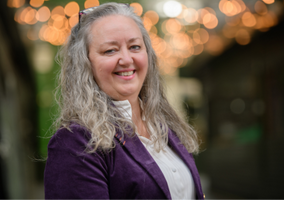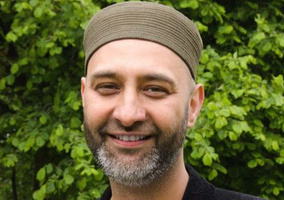Shameem Ahmad was involved with public law long before she became chief executive of the Public Law Project (PLP), having spent several years as a public lawyer with legal firm Herbert Smith Freehills.
But it was not until a secondment took her over to the charity sector that she began to consider a career move in that direction.
This was not just any old secondment. Ahmad was tasked with helping set up the Black Equity Organisation, an anti-racism charity that works from a Black perspective to dismantle systemic racism. She describes the temporary move as “a real transition point”.
During her maternity leave, Ahmad cemented her shift, leaving her law firm to move permanently over to the Black Equity Organisation as its full-time director of advocacy. She remained there until January 2023 when she replaced Jo Hickman as the CEO of PLP, which promotes access to justice for marginalised people.
“The transition to the charity sector was relatively smooth in the sense that I’m a public lawyer by background – and what we do is public law,” says Ahmad. She remains a practising lawyer, although she no longer has her own caseload.
‘Maintaining optimism is a hard sell’
As a child growing up in the north of England on a council estate and in a family claiming benefits, Ahmad lived alongside some of the very people she is now able to help through PLP’s work.
“I used to live next door to asylum seekers,” she recalls. “I used to hear them scream at night and suddenly hear them stop. As a child, that silence was terrifying and as an adult, I get to run a charity that tries to alleviate some of the pressures they’re under and the enormity of that privilege – it’s not nothing.”
First established in 1990, PLP aims to improve marginalised people’s often restricted access to public law. Its work generally takes on test cases, or lawsuits whose purpose is to establish an important principle or precedent for the legal system.
Recently, it has worked on everything from the 2019 prorogation of parliament to the last Conservative government’s infamous Rwanda deportation policy and to working with people victimised by the Department of Work and Pensions’ (DWP) policies around Universal Credit overpayments.
Two years into PLP’s 2022-25 strategy and in the 18 or so months since Ahmad took up her role as CEO, there has been an enormous amount of political and economic upheaval to contend with – which has made a difficult role even more so.
“One of the most challenging aspects is the amount of stuff you still have to respond to in a reactive, tactical way, as opposed to a strategic way, necessarily so,” she says. Besides parliamentary prorogation and the Rwanda scheme that includes the Windrush scandal, the almost complete decimation of legal aid… so many horrifying things”.
Maintaining optimism, Ahmad acknowledges that it “is quite a hard sell”. Yet, as a public lawyer, understanding that the state can do “real good” as well as harm and that public law principles are supposed to help the state make good decisions, is central to how she operates as CEO.
“The state is capable of good – I think that a lot of people find that statement quite jarring,” she says, citing examples of the services provided by the NHS and education system.
“In recent years, people have lowered their expectations of what they expect from the state, and the standards they expect, and the way that decisions are made, so I think the hardest thing about the job is keeping the expectations high of what we expect in an environment that is not built for that.”
Strong connections
Against this backdrop, it seems more important than ever for Ahmad and her colleagues at PLP to forge strong ties with people who benefit from their services, many of whom are among society’s most vulnerable.
“I grew up on benefits, on a council estate, and it gives you a grittiness,” she says. “They call it the working class for a reason – you’re not afraid of hard work. Those things help if you’re a leader. You’re unabashed about having to think about working hard.
“Feeling a really strong connection to our beneficiaries is incredibly helpful. As a leader, you’re not always getting to make the easiest of decisions, and being connected to your mission as an organisation is so important in those circumstances.”
Ahmad cites the example of a recent test case PLP took on. ‘K’, a single mother of two children with SEN, was subject to a Universal Credit overpayment of £8,600 due to an apparent fault in DWP’s computer system.
The charity represented her in court to ensure she would not have to pay that sum back. Ahmad feels her background enabled her to feel “a connection to understanding not just what that money means but what the impact of that must be”, something she describes as “enormously helpful”.
Auditing lived experience
At PLP, Ahmad is far from the only person to hail from the same background as their beneficiaries.
“Some 40% of my colleagues have lived experience of migration,” she says. “Some 70% of my colleagues have lived experience of aspects of what we define beneficiaries as internally. Some 90% of our board have lived experience.
“So, the types of people that are working at PLP, and fundamentally, the types of people who are upholding the rule of law, access to justice, and these lofty principles, are drawing on that connection.”
Against the backdrop of a sector where employees’ class diversity is reportedly being neglected, the diversity on display at PLP seems impressive – in no small part thanks to the significant efforts made by Ahmad and her colleagues.
Ahmad and her PLP colleagues implemented lived experience audits, where staff and trustees’ general backgrounds and their level of connections to their beneficiaries were researched.
“We hadn’t ever done one before at board or staff level,” says Ahmad. “For the first time, we also did a socioeconomic cross check.
“External stakeholders had a perception that we were quite an elite, very white organisation and digging into it a little bit more, that’s not necessarily the case.
“Part of what I want us to do is to be able to speak courageously and authentically and all of that requires knowing who we are first, just as any individual would need to: you need to know who you are before you can act courageously or authentically. That’s no different for an organisation.”
Positive noises from government
Like many in the sector, PLP waited with bated breath in July when the new Labour government was elected after 14 years of consecutive Conservative rule.
Since then, the new government has been vocal about its desire to “reset” its relationship with civil society, which has been welcomed by many in the sector. How has this affected PLP and its work?
“I think largely the noises are positive,” says Ahmad. When the most recent Conservative government was in power, its apparent fixation on ‘culture wars’ meant many charities like PLP, with its focus on the same marginalised people that several government ministers repeatedly demonised with its policies, struggled to do their work properly.
Ahmad recalls, in particular, a test case that they dealt with of a male migrant who was made subject to the Rwanda policy. When the Conservatives lost power, the new Labour government immediately scrapped the Rwanda policy – and with it, the harrowing case of PLP’s beneficiary who is no longer at risk of deportation.
“It’s nice to know some of that [Conservative Party] rhetoric is going to dial down,” says Ahmad. “That will make for a much more grown-up environment in which to be able to have checks and balances and a constitution that’s functioning. So, all of that is positive.
“We’ve had some great engagement,” she adds. “The government has been reaching out to us and including us in conversations, which has been wonderful.
“I will say that under the last government, in some areas of work, we were still able to have some traction internally, but it wasn’t the case across everything that we were doing.”
It is still early days though and there are still many pieces of key legislation that Ahmad and her colleagues at PLP would like to see overturned.
For starters, there is the Illegal Migration Act, which was introduced by former home secretary Suella Braverman and was responsible for the Rwanda policy, but which the new government has shown no signs of abolishing or adapting anytime soon.
Ultimately, Ahmad says, “the proof will be in the pudding”.












